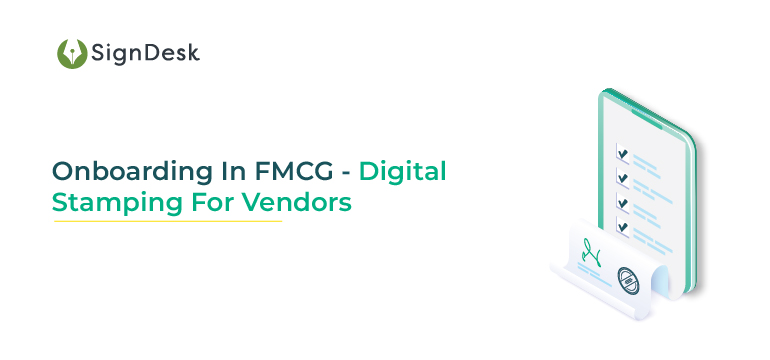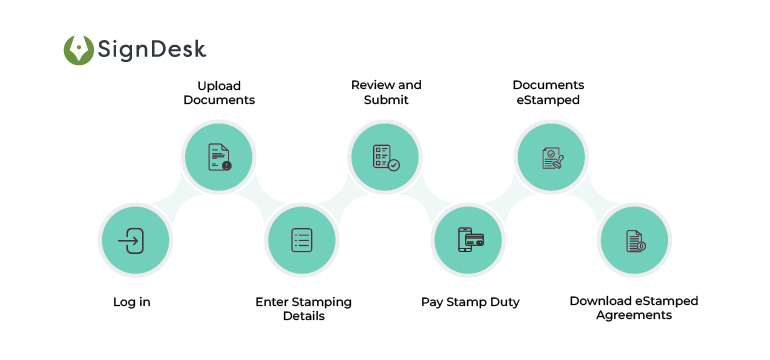
Introduction
Digital Stamping is a means of paying non-judicial stamp duty on agreements, contracts, and other legal technology-enabled documents. Digital stamping for vendors involves an eStamping operation in which document or contract owners pay the required stamp tax online and have their document eStamped and merged with stamp paper. It is an alternative to traditional means of stamp duty payment such as paper stamps and franking.
Manually paying stamp duty for vendor agreements and having onboarding documents physically stamped takes time and extra work, which is not ideal for business efficiency. Businesses typically need to rely on several teams of agents for stamp paper procurement and logistics, when utilizing physical stamp duty payment.
Electronic or online stamping provides a quick and effective way for firms to get their documents stamped quickly. This is done by simply uploading vendor agreements en masse onto a digital stamping platform, paying stamp duty in real-time, and downloading eStamped agreements in minutes.
eStamping, as it is a procedure of online stamping, is simple to use and makes vendor documents tamper-proof. The process also serves as confirmation that the businesses have paid the applicable stamp duty to the government to onboard vendors.
E-stamp or digital stamps can be implemented in most Indian states. Other semi-online stamping technologies, such as eSampadha and eSBTR, are operating in states such as Rajasthan and Maharashtra.
The digital stamps can be used as both confirmations of stamp duty payment and also as an electronic document or other pieces of information that came from the institution that sent it.
Structuring Vendor Onboarding For FMCG
As the Fast Moving Consumer Goods or FMCG market is heavily reliant on vendor-based services, vendor onboarding and contract execution are critical aspects of the business. The manual onboarding procedure necessitates the purchase of stamp paper, printing the document/agreement on it, and having it signed by all parties engaged in the transaction.
The vendor onboarding process involves several crucial touchpoints and the creation of a flexible framework to limit risk and supply chain disruptions. Here are the essentials of any vendor onboarding process.
- Establishing vendor evaluation and approval processes – creating a set of steps to decide whether a vendor is a right fit for a business’s requirements, and then getting the vendor approved by management
- Defining the requirements and expectations – Definitive policies and expectations are set out to boost efficiency while reducing uncertainty and potential friction
- Implementing a vendor registration and data gathering platform – Businesses integrate with a vendor documentation platform to collect & verify vendor KYC. A documentation platform with digital stamping integrations expedites this step further by accelerating vendor contracting and stamp duty payment.
- Creating a process for strategic supplier partnerships – Since strategic partners have a large impact on organizational health, FMCG companies should design custom onboarding processes for various requirements. Leveraging a digital documentation platform here enables businesses to use low-code building blocks to design their own vendor onboarding journeys replete with online stamping.
- Establishing a communication system – Keep communication at the forefront of vendor operations at all times; this will help enhance logistical efficiency, decrease the danger of delays due to human error, and improve relationships with suppliers.
Is Digital Stamping Valid For Vendor Onboarding?
The Indian Stamp Act of 1899 requires a fee to be paid for documents used in legal transactions and contracts for a variety of purposes, including vendor onboarding.
Digital stamping is still a relatively new procedure, therefore small reservations about its legal usefulness are understandable. Although digital stamping is not stated explicitly in the Indian Stamp Act, the eStamping technique is now widespread in almost every state, and state governments have created E-Stamping laws and regulations to govern online stamp duty payment.
The Indian government launched the e-stamping service in July 2013 in an effort to prevent counterfeits and errors. For all e-stamps, the Stock Holding Corporation of India Limited (SHCIL) serves as the country’s Central Record Keeping Agency (CRA).
eStamping is now available in Odisha, Haryana, Gujarat, Karnataka, Delhi, Bihar, Assam, Tamil Nadu, Rajasthan, Himachal Pradesh, Andhra Pradesh, Uttarakhand, and the union territories of Dadra & Nagar Haveli, Daman & Diu Puducherry, Jharkhand, and Uttar Pradesh, West Bengal, and Chhattisgarh.
The state administration of the Indian state of Kerala ceased the implementation of e-stamping for values less than INR 1 lakh, including both registrable and non-registrable documents, in 2021.
How to Pay Stamp Duty Online For Vendor Agreements
Stamp duty can be paid digitally by businesses by following a few simple steps. Companies can use the following techniques to have their documents electronically stamped:

- Log in:
Integrate with a digital stamping solution via APIs, mobile SDKs, or web portals. Log into the portal to start uploading & eStamping.
- Upload Documents:
The next step is to upload the documents to be stamped. e Stamping can be applied to a single document or several documents. SignDesk also provides ready-made template libraries for creating legally valid agreements.
- Enter Stamping Details:
The next stage requires the user to provide information about the stamping transaction, such as the first and second parties, stamp denominations, and the state where the stamping will take place.
- Review and Submit:
The user previews the documents to be eStamped and the information on the application. This is then submitted.
- Pay Stamp Duty:
Next, the user must pay the prescribed stamp duty to complete the process. Online stamp duty payment is made using net banking, cheques, credit or debit cards, or demand drafts. SignDesk also provides a digital wallet for easy stamp duty payments.
- Documents eStamped:
Following payment, the document is electronically stamped and fused with digital stamp paper. Following this, the customer is given the eStamp certificate along with a QR code to help with stamp paper verification.
- Download eStamped Agreements:
Finally, the batch of eStamped documents are made available to the business for download. Stamping status can be tracked throughout this process on SignDesk’s smart dashboard.
Digital Stamping Benefits For FMCG
The process of vendor onboarding is immensely important in the FMCG sector. The advantages businesses experience due to onboarding automation effected by digital stamping are as follows:
- Improved Process Efficiency:
eStamping saves time & resources for businesses because digital stamp paper may be generated in minutes. This means that procurement teams and vendors aren’t subjected to long procurement cycles and the onboarding process is shortened significantly.
- Tamper-Proof Agreements:
The eStamping technique provides a tamper-proof and secure e-stamp certificate for enterprises. A Unique Identification Number (UIN) issued for the eStamp paper and stamp-specific QR codes add an extra degree of protection for vendor agreements.
- Easy Stamp Verification:
Following digital stamping, users can simply verify whether or not the certificate issued to them is legitimate by using the inquiry module provided by the e Stamping website. This helps onboard vendors effectively and efficiently.
- Cost-Effective Procurement:
Businesses needn’t rely on teams to manually procure stamp papers from vendors. When documents are electronically stamped, there will be no additional fees or charges for procurement, storage & transport. This cuts vendor documentation costs by nearly half.
- Increased Document Accessibility:
All transaction data is maintained on the digital stamping platform, making cross-verification easier. Executed vendor agreements are available along with vendor profiles on the smart dashboard.
India’s Leading Digital Stamping Solution
SignDesk, India’s top provider of document automation services, provides a solution for Digital Stamping for vendors as well as an eSignature solution to help businesses go paperless via Stamp.It. Client organizations have reduced their paperwork turnaround time to minutes by leveraging these technologies.
FMCG (Fast Moving Consumer Goods) industry relies substantially on vendor services and has a high demand for vendor contractual agreements. Even if multiple parties are involved in the transaction, the contract can be completed in a single day using SignDesk’s Digital Stamping and eSign Workflow technologies.
Supplier & distributor agreements can be created, stamped, and signed in bulk using SignDesk’s Digital Signature Certificate (DSC) signatures. Book a free demo now to see how digital stamping accelerates vendor onboarding!